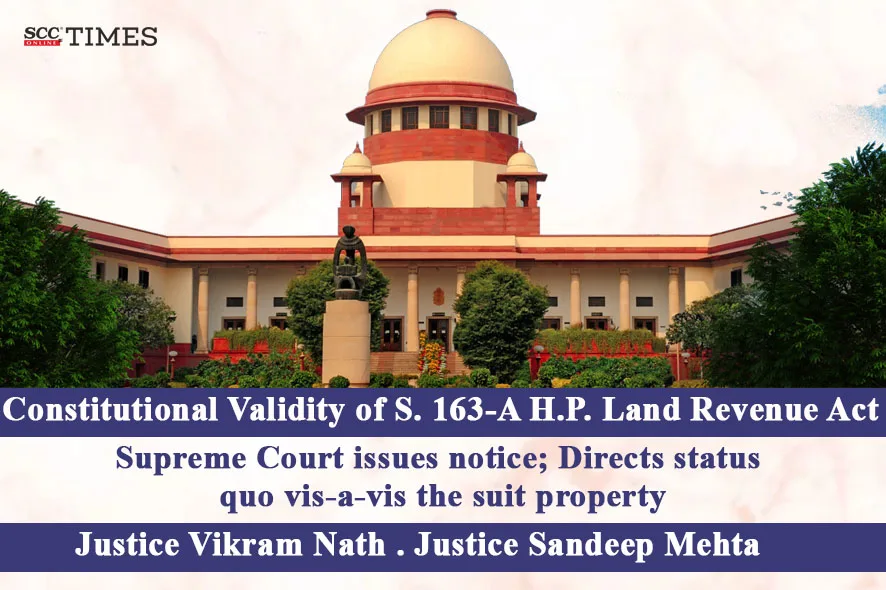Supreme Court: While considering this petition challenging the decision of Himachal Pradesh High Court’s decision declaring S. 163-A H.P. Land Revenue Act, 1954 (1954 Act) as unconstitutional, the Division Bench of Vikram Nath and Sandeep Mehta, JJ., directed status quo with regard to the suit property until further orders.
In 2002, a petition was filed questioning the validity of Section 163-A of the 1954 Act whereby the encroachments on Government land were sought to be regularised. The State in its reply to the petition informed that there existed approximately 57,549 cases of encroachments on Government land in the State covering an area of about 1,23,835 bighas or 10,320 hectares. Earlier, the cases of encroachments on Government land used to be decided under Rule 27-A of the H.P. Nautor Land Rules, 1968 but it was kept in abeyance. From 1983, the instructions qua regularisation of encroachments were issued by the Government from time to time and the same were ultimately revised in 1994 permitting the regularisation of up to 2 bighas of the land contiguous to the ownership land, which was challenged by way of public interest litigation.
Thereafter, a high-powered committee (‘HPC’) was constituted to examine the issue of encroachment in the State and was asked to suggest a viable solution to the endemic problem. The HPC proposed the incorporation of Section 163-A in the 1954 Act. Upon the HPC’s recommendations, response of public at large and Panchayati Raj Institutions and after the discussions at various levels, the State brought about the amendment to incorporate Section 163-A in the 1954 Act. Furthermore, the State, vide Notification dated 19-04-2017, had notified Draft Rules for regularization of encroachment by publishing it in the Rajpatra of Himachal Pradesh for inviting objections. Though the Rules were never finalised.
The Division Bench of Vivek Singh Thakur and Bipin Chander Negi*, JJ., while deliberating over the issue in Punam Gupta v. State of H.P., 2025 SCC OnLine HP 3494, opined that by condoning the illegal acts of the violators who carried out encroachments, the State intended to treat such law breakers as equal to those persons who abided by the law which was arbitrary because by treating un-equals alike, the State was violating Article 14 of the Constitution. The Court noted that the object of the impugned provision was violative of Article 14 of the Constitution as Article 14 was not meant to perpetuate illegality or fraud but was a positive concept.
Thus. the High Court held that Section 163-A of the 1954 Act was manifestly arbitrary and unconstitutional and therefore, Section 163-A and the Rules framed thereunder were quashed. The Court directed to ensure removal of encroachment on the Government land by initiating suitable proceedings against the encroachers, to be concluded on or before 28-02-2026. Any stay granted against removal of encroachment for pendency of this petition or any other ground, stood vacated and any such order was declared ineffective and unenforceable.
Aggrieved with the afore-stated decision, the present petition by special leave was filed before the Supreme Court contending that the impugned judgment suffers from constitutional infirmities.
Perusing the petition, the Supreme Court therefore, deemed it appropriate to issue notice and ordered maintenance of status quo vis-a-vis the suit property.
[Trilochan Singh v. State of Himachal Pradesh, 2025 SCC OnLine SC 2251, order dated 14-10-2025]
Advocates who appeared in this case:
For the Petitioner: Mr. Vinod Sharma, Advocate-on-Record; Mr. Gaurav Kumar, Advocate.
For Respondent: Mr. Gaurav Agarwal, Sr. Adv; Mr. C. George Thomas, AOR



